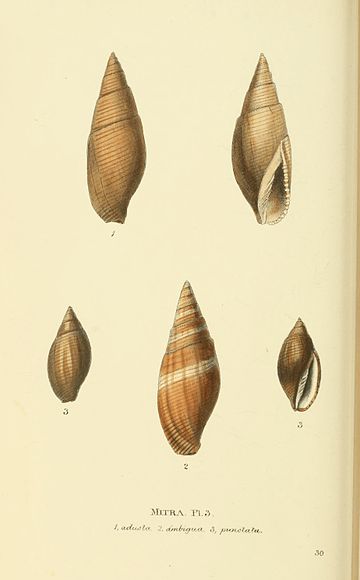Zoological Illustrations Series II/Plate 30
Mitra. Pl. 3.
1, adusta. 2, ambigua. 3, punctata.
MITRA fulva.
Specific Character.
Shell ovate-acute, smooth, fulvous, unspotted, marked with transverse sulcated striæ, containing punctured dots: body whorl contracted; suture crenated: base obtuse: outer lip thickly and strongly crenated; the crenations, and the plaits on the pillar, white.
The different nomenclature of Lamark and Dillwyn, induced us to suspect that our present species might still be retained under the name of adusta; but as a greater degree of confusion may perhaps arise in so doing, than that which we wished to avoid, we have now given it a distinct name, and defined its true characters. It is sometimes partially dotted with pure white. The M. adusta of Lamark is, in short, the same as the ruffina of Linnæus: or at least that species which Dr. Solander and Mr. Dillwyn conceive to be such. Our shell is from the Isle of France, and is not common: the crenated teeth on the lip are very strong; the base obtuse, and effuse: the spire and aperture of equal length.
MITRA ambigua.
Shell ovate-fuciform, rufous, with a white band near the suture, transversely striated and punctured, suture and outer lip crenated, base contracted; spire shorter than the aperture.
Less distinctly striated and punctured than the last; but differs considerably in being almost a fuciform shell: the base of the aperture is consequently contracted. We possess but one specimen, and know not its locality.
MITRA punctata.
Shell ovate, brown, striated and punctured: spire very small, somewhat conic: outer lip crenated: pillar six-plaited.
A beautifully perfect shell of this new and very rare species, we procured from our friend Mrs. Mawe; we have never seen another: the inside of the lip is margined with deep brown.

